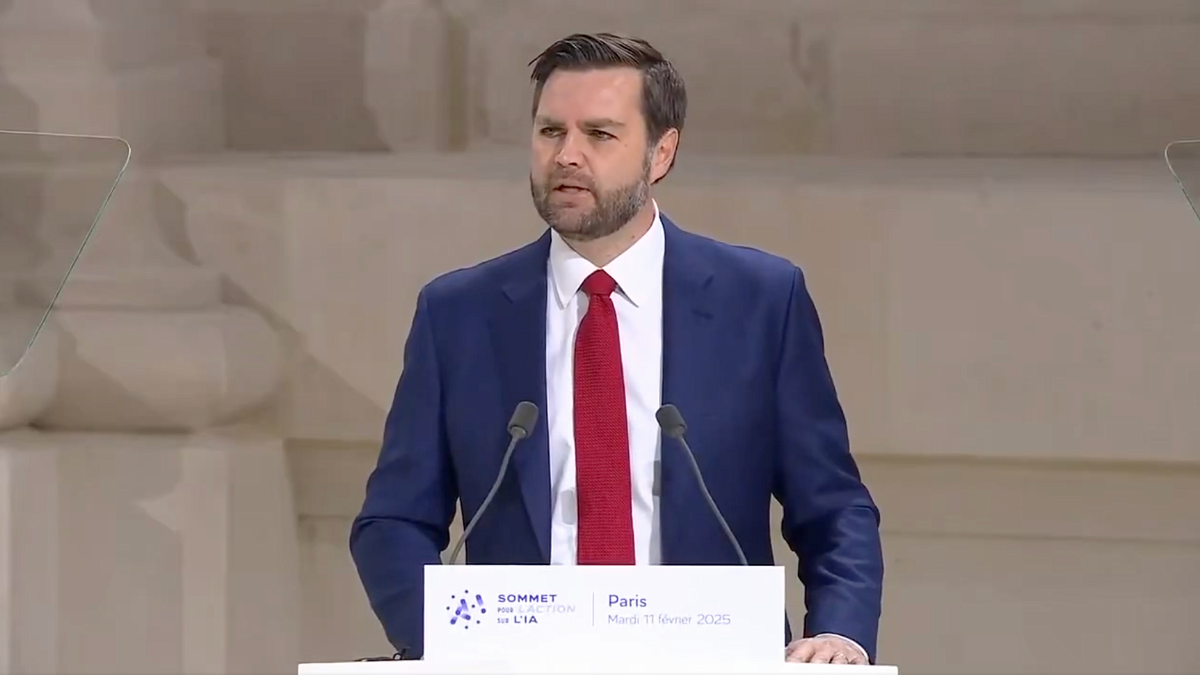At Paris AI Summit, US, EU, Other Nations Lay Out Divergent Goals
Mark Scott / Feb 11, 2025
February 11, 2025: US Vice President JD Vance delivers remarks at the Paris AI Action Summit. Source
PARIS — As global leaders gathered in the French capital for this week’s AI Action Summit, countries doubled down on efforts to dominate the emerging technology that has captured the public’s imagination.
In rival speeches at the Grand Palais — a 100-year-old glass-topped venue here that hosted global leaders, tech executives, and civil society organizations — US Vice-President JD Vance and European Commission President Ursula von der Leyen outlined rival visions on artificial intelligence that were couched in language like innovation, competition, and safety.
"This administration will ensure that American AI technology continues to be the gold standard worldwide,” Vance, a former US senator, told world leaders as he denounced further regulation that could hamper the technology’s growth.
"The United States of America is the leader in AI, and our administration plans to keep it that way,” he added.
Von der Leyen, a German politician now entering her second five-year term at the European Commission, countered with what she called Europe’s “distinctive approach to AI.”
The 27-country bloc is in the midst of implementing its comprehensive rules, known as the Artificial Intelligence Act, while responding to industry concerns that the legislation, which will only come into full force in late 2026, may undermine the European Union’s ability to compete globally.
“Bringing AI to industry-specific applications and harnessing its power for productivity and people,” von der Leyen told global leaders in Paris after announcing €50 billion in public support for European-based AI projects. “This is where Europe can truly lead the race.”
In truth, Washington and Brussels share similar goals in their rival approaches to artificial intelligence despite the Trump administration’s rebuke of new AI legislation and von der Leyen’s support of the bloc’s AI Act.
Both sides of the Atlantic hope to spur local innovation and economic development by spending hundreds of billions of dollars, in both public and private funding, in underlying infrastructure like high-performance computing to give their domestic firms a headstart over international rivals. Politicians are responding to domestic demands from industry eager to take advantage of the technology, and global competition from authoritarian regimes like China.
Last month, the White House announced a $100 billion investment, led by a consortium of OpenAI, SoftBank, MGX, and Oracle, to boost the US’ computing infrastructure. The EU’s €50 billion announcement on Feb 11 — part of a wider corporate investment pledge of a separate €150 billion in EU-based AI investments over the next five years — is Brussels’ response to Washington’s doubling down on critical infrastructure needed to develop the most advanced AI models.
In the AI Action Summit’s final communique, 60 countries, including France, India, China, and Canada, agreed to a series of voluntary commitments to make the emerging technology more inclusive and sustainable. The US and the United Kingdom did not sign the document — the first time either country has not signed such global statements ever since London hosted the first of these global AI summits in late 2023.
In his speech, Vice President Vance pushed back at global efforts to rein in AI via new rules. He claimed such legislation would throttle an industry that is only starting to take hold worldwide. “We need international regulatory regimes that foster the creation of AI technology rather than strangle it,” he told the audience in Paris.
Despite Europe’s new comprehensive AI rulebook, Brussels and other EU capitals are now reassessing how far to push this legislation amid industry claims that over-regulation would put the bloc at a disadvantage compared to global rivals.
In the build-up to the AI Act’s completion in late 2022, French President Emmanuel Macron urged his EU counterparts to temper the rules to support European companies. Eventually, those pleas fell on deaf ears.
Yet as global leaders depart Paris after this week’s two-day AI summit, Macron’s vision of AI — one that pares back new legislation and pushes public-private investment to build national champions to compete on the global stage — has become the de facto standard across the 27-country bloc.
Mirroring policies implemented by both former President Joe Biden and the new Trump administrations, Europe now wants to show it is open for business by funneling tens of billions of euros into an emerging technology that politicians believe will jumpstart countries’ sluggish economies. That includes Brussels going toe-to-toe with Washington by earmarking new funds to promote its own vision of AI to compete with what the US will continue to champion.
"We will simplify," Macron told the AI Action Summit in reference to likely pullbacks on European oversight of AI systems. "It's very clear we have to resynchronize with the rest of the world."
Authors
